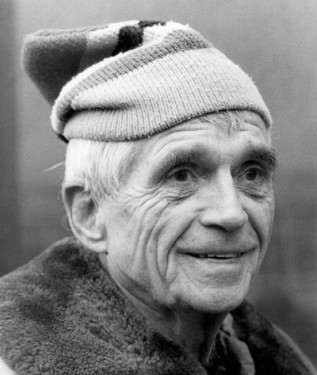
Jesuit Father Daniel Berrigan, an early critic of U.S. military intervention in Vietnam who for years challenged the country’s reliance on military might, died April 30 at the Jesuit residence on the campus of Fordham University, the Bronx. He was 94.
The author of several books of poetry and one of the first Catholic priests to receive a federal sentence for peace activism, Father Berrigan protested government policies in word and in deeds, which garnered several stays in jail and in federal prison.
A funeral Mass was planned for May 6 at St. Francis Xavier Church, Manhattan. Family members and others were to gather prior to the Mass for a peace witness followed by a march to the church.
Father Berrigan, with others, gave birth to the Plowshares movement to oppose nuclear weapons. On Sept. 9, 1980, Father Berrigan, his brother Philip, and six other demonstrators were arrested after entering the General Electric missile plant in King of Prussia, Pa., and battering intercontinental ballistic missile nose cones with hammers and pouring blood over classified defense plans.
They were found guilty of burglary, criminal mischief and criminal conspiracy and sentenced in July 1981. The Berrigan brothers, Oblate Father Carl Kabat and Baltimore lawyer John Schuchardt received the stiffest sentences, three to 10 years in prison.
The protest was the second major action for which he was arrested. On May 17, 1968, Father Berrigan and eight others entered the Selective Service office in Catonsville, Maryland, a Baltimore suburb, removed 378 files and burned them in an adjacent parking lot with what they called “homemade napalm.”
In 1939, he began the Jesuit training program.
After his novitiate, he studied philosophy at Woodstock College in Maryland, taught French, English and Latin for four years at St. Peter’s Prep in Jersey City, N.J., studied theology for three years at Weston College in Massachusetts, and was ordained on June 19, 1952.
In July 1953, Father Berrigan was sent to France for a year of study and ministerial work in a small town near Lyons. In France, he met some worker-priests who gave him, he later said, “a practical vision of the Church as she should be.”
Returning to New York in the fall of 1954, he taught French and theology at Brooklyn Prep and led teams of students working in poverty areas in Brooklyn and Manhattan’s Lower East Side.
From 1957 to 1963, he was professor of New Testament studies at LeMoyne College in Syracuse. Returning to New York in the fall of 1964, he began involvement in protest against the war in Vietnam. He helped to found the controversial Clergy and Laity Concerned About Vietnam.
In November 1965, the Jesuit superiors sent him to Latin America in what was described as a reporting assignment for Jesuit Missions magazine. His supporters interpreted the assignment as an attempt by the New York Archdiocese to silence him.
In March 1966, Father Berrigan returned to New York and anti-war activities. He was the author of more than 16 books of poetry and essays.
Later in life, his work focused ministering to people with AIDS in New York City. He also visited Zuccotti Park in New York to support the brief Occupy Wall Street movement in 2012.
